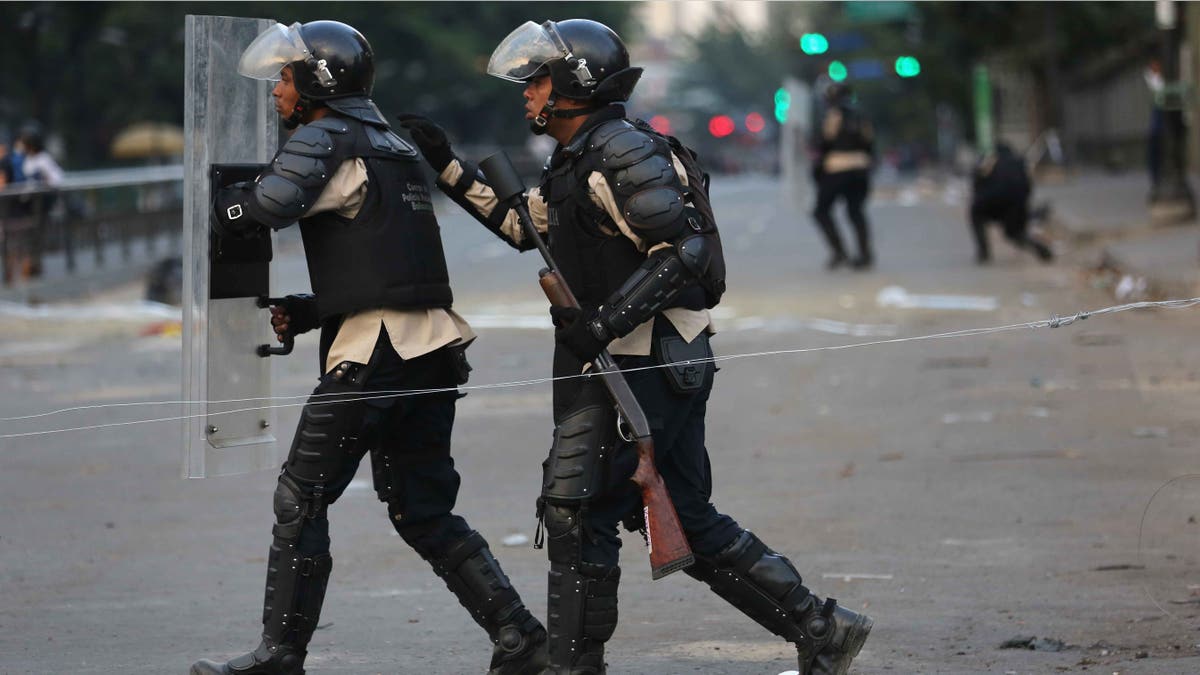
CARACAS, VENEZUELA - MARCH 06: Venezuelan national policemen advance on anti-government demonstrators on March 6, 2014 in Caracas, Venezuela. Protesters continued to stage demonstrations nationwide against high inflation and crime. (Photo by John Moore/Getty Images) (2014 Getty Images)
Last week Venezuelans received with a mix of surprise, relief and skepticism the news of an early morning police raid into one of the most violent neighborhoods of west Caracas, home to a slew of heavily armed gangs.
The takeover of Cota 905 ended up with 15 gang members dead and 134 arrested, according to official reports, which described the operation as part of a new security plan called “Operación de Liberación y Protección del Pueblo” (Operation Liberation and Protection of the People) to be implemented in the areas of the country deemed the most unsafe.
Even when Venezuela qualifies as the second most violent country in the world behind Honduras, political analysts from the opposition think that the government of Nicolas Maduro is focusing on the security issue only to recover its dwindling approval ratings -- now down to less than 30 percent across the nation.
Oswaldo Ramírez, a local political consultant, told Fox News Latino the new plan will most likely focus on urban areas where Chavismo is losing track. Cota 905 is one of them, part of an electoral district where two of the 167 National Assembly representatives are up for election on December 6.
“Maduro is already on campaign mode,” Ramírez said.
“Polls show that the biggest problems for Venezuelans today are the economic crisis and the insecurity [levels] -- with the second one you can create a quick and big effect in public opinion with operations like the one they did on Monday,” he added.
During Cota 905 raid, which lasted approximately nine hours, authorities recovered 20 stolen cars, 12 guns, 2 rifles and 2 grenades. More than 250 security officials from the National Guard and the police participated in the operation, officials said, noting that all the fatalities belonged to a gang called “El Coqui.” Human rights organizations, however, denounced over the weekend police abuse during the operation and are demanding an investigation.
Supporters of the plan said action is needed to curb the increasing homicide rate -- 24,980 people were killed last year, according to Venezuela’s Observatory of Violence. That’s 68 people a day and 82 out of every 100,000 citizens.
“This is the 21st security plan implemented by Chavismo to stop crime,” said Fermin Marmol, criminology professor at a local university, to FNL.
“None of the others [plans] had worked and if the trends continue as they are right now by the end of this year we could have a rise in murders of around 10 percent,” he continued.
All the state-owned media, which barely covers crime stories or minimizes them, made a splash of the raid.
Marmol doesn’t rule out the possibility that the new security plan has an electoral goal, but he argues that it’s a “fair” thing to do as long as the operation works and it is not just a show.
“Actions like [these] have to be accompanied by social plans previously arranged with the neighbors of each sector to make the police presence permanent. If they enter in the morning and leave by the afternoon, street gangs will come back and it’s like doing nothing,” Marmol said.
No further planning appeared to be evident in Cota 905 nor in the others places taken over by police in Caracas and the center state of Aragua in the following days. The majority of neighborhoods raided are segments known as “peace zones,” that is, zones stripped of uniformed police as part of a truce negotiated with criminal bands in September 2013.
Marmol thinks that all the peace zones must be eliminated because the policy hasn’t worked. “Crime rates jumped and now gangs control the places,” he said.
According to the Venezuelan Observatory of Organized Crime, a local NGO, 12 big criminal gangs are operating right now in Caracas and the states of Miranda, Aragua, Guárico (in the center of the country), Zulia (west) and Bolívar (south).
On the night of the Cota 905 raid, President Maduro came out on national TV and said he had personally ordered the new plan. “We will free communities all around the country,” he said, requesting the support of the people.
Still, many political analysts insist it’s all part of an aggressive move to win back disenchanted chavistas – a move that includes adding thorny issues to the national agenda, such as the territorial fight with Guyana.
“For now they will try to recover political ground with this new security plan and appealing to patriotism, like speaking about the territory’s dispute [with neighbor Guyana],” Ramirez said.
“Closer to the election, they will try to fix some economic problems, like shortages, and will announce some populist decisions,” he predicted.












































